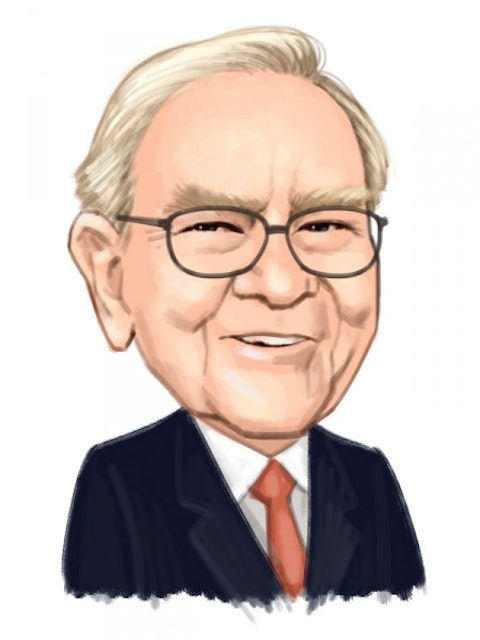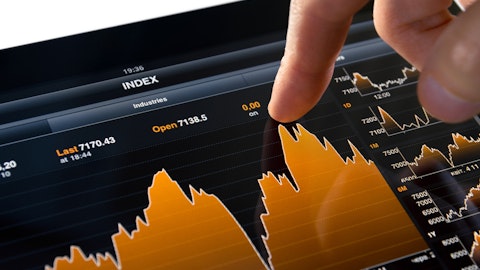In this article we presented the top 10 dividend stocks Warren Buffett likes the most. Click to skip ahead and see the top 5 dividend stocks Warren Buffett likes the most.
The legendary billionaire investor Warren Buffett, who is known for following Benjamin Graham’s value investing approach, loves to buy dividend stocks at discount. He holds these stocks for the long-term in the wake of value generation as well as returns through cash dividends. Buffett’s investing strategies and stock picks have long been considered a reliable approach for defensive investors to follow.
Warren Buffett’s investment holding company Berkshire Hathaway has generated an average return of almost 20% since it began trading in 1965. This means that if one has invested $10000 in Berkshire Hathaway stock, the investors would have generated $274 million as of the end of 2019. Meanwhile, the broader market index has generated a 10% compound annual growth rate during the same time period.
This year, the pandemic has significantly impacted the performance of companies owned by the Oracle of Omaha. He has sold his entire stakes in the hardest hit passenger airline companies while banking and insurance stocks have also been under pressure due to economic instability.

Warren Buffett of Berkshire Hathaway
Consequently, the shares of Buffett’s investment holding company Berkshire Hathaway remained under pressure throughout the second and third quarters of 2020.
However, the legendary investor has used the dip in its share price as a buying opportunity. Buffett’s conglomerate has repurchased a record $9 billion of its own stock during the September quarter following a buyback of $5.5 billion in the second quarter.
“Berkshire will buy back its stock only if a) Charlie and I believe that it is selling for less than it is worth and b) the company, upon completing the repurchase, is left with ample cash,” Buffett wrote. “Over time, we want Berkshire’s share count to go down. If the price-to-value discount (as we estimate it) widens, we will likely become more aggressive in purchasing shares. We will not, however, prop the stock at any level,” he added.
Besides share buybacks, the Oracle of Omaha has extended its strategy of investing in stable companies that offer hefty dividend yields. He added 3.7 million Pfizer (NYSE:PFE) shares during the September quarter, which soared almost 15% in November amid a leading position in the coronavirus vaccine race. The pharmaceutical company also offers a dividend yield above 3.5%.
The legendary investor has showed confidence in several other drug companies including AbbVie (NYSE:ABBV), Merck (NYSE:MRK), and Bristol Myers Squibb (NYSE:BMY). All these drug stocks have a long dividend growth history.
Meanwhile, Buffett led Berkshire Hathaway continued to trim its long-running positions in struggling banking companies like Wells Fargo (WFC) and JPMorgan Chase (NYSE:JPM).
Wells Fargo’s business fundamentals have been devastated by the pandemic. The shares of the financial services company fell 46% in the past twelve months amid massive credit losses and a double-digit decline in revenues. The more than 50% year over year drop in profits has also forced the company to slash its dividends by 80% to only $0.10 per share.
Berkshire Hathaway has lowered its stake in long-running investment in Wells Fargo from 3% to 1.31% of the overall portfolio during the third quarter. He still holds almost a $3 billion stake in the scandal-ridden bank that is likely to make big strategic changes in the days ahead.
Buffett’s investment holding company Berkshire Hathaway slashed almost all of its stake in America’s largest bank JPMorgan Chase during the September quarter. Berkshire currently holds only 1 million shares of JPMorgan compared to 22.2 million shares at the end of the last year.
While Warren Buffett’s reputation remains intact, the same can’t be said of the hedge fund industry as a whole, as its reputation has been tarnished in the last decade during which its hedged returns couldn’t keep up with the unhedged returns of the market indices. On the other hand, Insider Monkey’s research was able to identify in advance a select group of hedge fund holdings that outperformed the S&P 500 ETFs by more than 78 percentage points since March 2017 (see the details here). We were also able to identify in advance a select group of hedge fund holdings that significantly underperformed the market. We have been tracking and sharing the list of these stocks since February 2017 and they lost 13% through November 16. That’s why we believe hedge fund sentiment is an extremely useful indicator that investors should pay attention to. You can subscribe to our free newsletter on our homepage to receive our stories in your inbox.
Let’s now begin our countdown of the 10 Dividend Stocks Warren Buffett Like the Most.
10. Johnson & Johnson (NYSE:JNJ)
Buffett first invested in the dividend king Johnson & Johnson (JNJ) back in 2006 and the legendary investors still hold 327,100 shares, according to the latest filings.
Back in 2007, Berkshire’s stake in the diversified health-care giant topped out at 64.3 million shares. The firm sold the majority of its stake in 2012. Johnson & Johnson currently accounts for 0.02% of the portfolio. This dividend king has raised dividends in the past 58 straight years.
9. Mastercard Incorporated (NYSE:MA)
The card network payment company Mastercard (NYSE: MA) is among the dividend stocks most like by Warren Buffett. Mastercard currently accounts for 0.67% of Warren Buffett’s portfolio valued at $1.5 billion. Berkshire first initiated a position back in 2011.
Mastercard has raised dividends at an average of 24% in the past five years. It currently offers a quarterly dividend of $0.40 per share. In addition to dividends, its share price grew 1250% in the past ten years. The financial numbers of the card network payment company came under pressure this year due to restrictions on international traveling. However, the vaccine discovery is likely to improve its performance in fiscal 2020. Qualivian Investment Partners recently talked about Mastercard in its 2020 Q3 investor letter:
“Mastercard: MA continued to see significant headwinds in its higher margin cross-border transaction volumes/revenues because of the drastic drop in cross-border travel (both personal and corporate) due to COVIDrelated lockdowns. We do not see this portion of MA’s business recuperating before the wide-scale global distribution and adoption of a COVID vaccine in the back half of 2021 going into 2022. The flipside to this is that COVID has accelerated the digitization of cash payments, especially as card not present eCommerce transactions continue to accelerate in the COVID era, and likely permanently shifting consumer shopping and payments behavior in favor of digitized transactions. The other offset to the weakness in cross-border volumes we saw is better expense control on the part of the management team, which will likely continue in the coming quarters. While MA’s cross-border revenues and earnings will continue to be impacted in the next 9-12 months, we expect the continued share gain of digital cash payments at the expense of paper transactions to accelerate. Furthermore, MA continues to invest in value-added services (marketing, fraud detection, etc…) as well as supporting more digital payment modalities on their payment rails, supporting our long-term thesis on this digital payment stalwart.”





